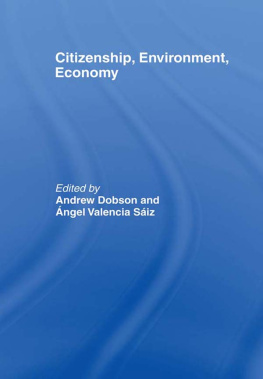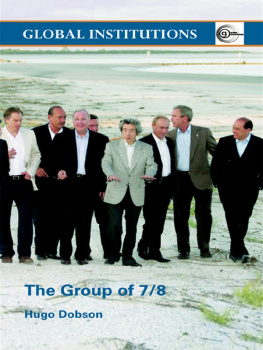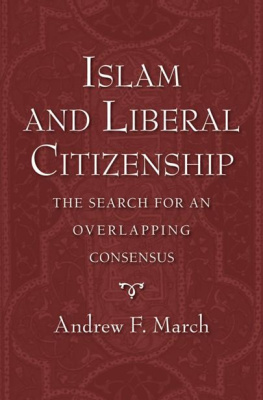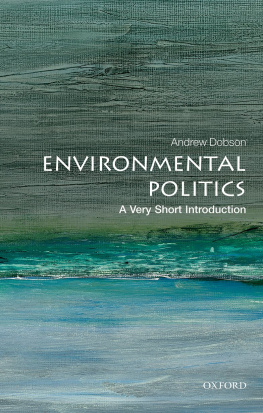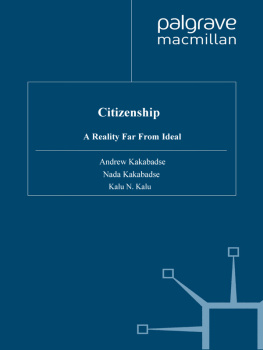CITIZENSHIP, ENVIRONMENT, ECONOMY
As governments around the world grapple with the challenge of delivering environmental sustainability, attention has recently focused on the role that citizens should play in meeting the challenge. In advanced industrial countries such as ours, which operate in the political framework of liberal capitalism, what relevance can we place on environmental citizenship?
This book looks at the obstacles and opportunities which exist within this context and examines the possibility of ethical investment, the social economy and considers whether there is space in the capitalist economy for environmental citizens to do the right thing?
This book was previously published as a special issue of the leading journal Environmental Politics.
Andrew Dobson is Professor of Politics at the Open University, UK.
ngel Valencia Siz is a Senior Lecturer in the Politics Department at the University of Malaga, Spain.
CITIZENSHIP, ENVIRONMENT, ECONOMY
Edited by
Andrew Dobson and
ngel Valencia Siz
First published 2005
by Routledge, an imprint of Taylor & Francis
2 Park Square, Milton Park, Abingdon, Oxon, OX14 4RN
Simultaneously published in the USA and Canada
by Routledge
270 Madison Ave, New York, NY 10016
Routledge is an imprint of the Taylor & Francis Group
2006 Taylor & Francis Group Ltd
Typeset in Times by Elite Typesetting Techniques Ltd,
Eastleigh, Hampshire, UK
Printed and bound in Great Britain by Anthony Rowe Ltd,
Chippenham, Wiltshire
All rights reserved. No part of this book may be reprinted or reproduced or utilised in any form or by any electronic, mechanical, or other means, now known or hereafter invented, including photocopying and recording, or in any information storage or retrieval system, without permission in writing from the publishers.
British Library Cataloguing in Publication Data
A catalogue record for this book is available
from the British Library
Library of Congress Cataloging in Publication Data
A catalog record for this book has been requested
ISBN: 0-415-36672-0
CONTENTS
ANDREW DOBSON AND NGEL VALENCIA SIZ
ENVIRONMENTAL CITIZENSHIP: TALKING IT OVER
NGEL VALENCIA SIZ
DEREK R. BELL
SIMON HAILWOOD
EMILIO LUQUE
MOJCA DREVENEK
ENVIRONMENTAL CITIZENSHIP: THE ECONOMY
JOAQUN VALDIVIELSO
NEIL CARTER AND MEG HUBY
GRAHAM SMITH
GILL SEYFANG
ANDREW DOBSON* & NGEL VALENCIA SIZ**
* Department of Government and Politics, Open University, Milton Keynes, UK, ** Department of Government and Politics, Open University, Milton Keynes, UK
Citizenship has come to seem important in the environmental context for two sorts of reasons theoretical and practical. From a practical point of view, governments and their agencies seem slowly to be coming to realise that they cannot create sustainable societies on their own. As the vogue has it, we are moving from government to governance, and while this rhetoric offers liberal-capitalist governments the opportunity to row back on the publicly-provided elements of their responsibilities (an opportunity they seem only too willing to grasp), it also focuses attention on the role that civil society might play in achieving political objectives. It can be assumed that sustainable development is one of these objectives broadly endorsed by governments around the world and that the turn to citizenship implies that citizens as well as governments have a role to play in bringing it about. At the same time, of course, it will always be part of environmental citizens' responsibilities to work towards making sure that governments do what they must to provide the context for sustainable behaviour.
There seems to be a consensus among analysts of this turn to citizenship that the very enlisting of the idea implies a recognition that sustainability requires shifts in attitudes at a deep level deeper than those reached by fiscal measures such as traffic congestion charging or charges levied on household waste. These measures only work, so the suggestion goes, as long as they are in place. They change behaviour, but they do not necessarily change attitudes and if they are removed, behaviour could revert to type. The citizenship approach to sustainability, then, aims at attitudes, and it does so in part by drawing on a powerful commitment in citizenship theory and practice through the ages to the idea of the common good. Sustainable development is often regarded as an example of what a specific common good might be, and so there is a synergy between citizenship, which enjoins citizens to aim at the common good, and sustainable development, which exemplifies what a common good might look like.
So while sustainable development might be thought of as a candidate for the status of a common good, it is not always in every individual's self-interest to act sustainably. This, again, is where citizenship offers resources to those in the policy community charged with marking out routes to sustainability. For part of what it might mean to be an environmental citizen is to examine the effects of self-interested behaviour on the common good objective of sustainable development. There will be times, of course, when self-interested behaviour is happily coincident with sustainability objectives (even on a narrow interpretation of what self-interest might involve), but citizenship opens up and offers the possibility of checking self-interest against the common good in systematic ways, because this is part of what citizenship as concept and practice is about.
So far, so predictable (perhaps), but it has been pointed out above that there is theoretical as well as practical interest in the encounter between citizenship and the environment. One of the results of holding citizenship up to the environmental mirror is that citizenship as an idea or a concept undergoes subtle but unmistakable modifications. What one of the authors has referred to as the architecture of citizenship (Dobson, 2003: 209) has been pretty well established through its historical discursive and practical development, but inflections and variations within this architecture are possible perhaps to the point where the building itself begins to look rather different. In this context, environmental or ecological citizenship amounts to explorations of citizenship's architecture, coupled with an invitation to mainstream analysts of citizenship to take a trip around their possibly reconfigured dwelling. Much of this theoretical background is covered in ngel Valencia Siz's opening chapter, which is designed to set the scene for the rest of the issue, and more will be said about this study and the others shortly.
All the chapters in this book are thoroughly reworked and refereed versions of papers first delivered at the European Consortium of Political Research's (ECPR) General Sessions, held in Uppsala, Sweden, in April 2004. As co-directors of the workshop, the authors were aware that quite a bit of the necessary exploratory and collaborative work on environmental or ecological citizenship was already being done (see, for example, Dobson & Bell, 2005), and so it was decided to combine further work of that kind with more focused attention on what was becoming to seem a key issue in the debate: the nexus between environmental citizenship and political economy. What opportunities (if any) does the economic sphere offer to those who wish to practise environmental citizenship? What kinds of transformation (if any) of the economic sphere are necessary to make it compatible with the processes and objectives of environmental citizenship?


